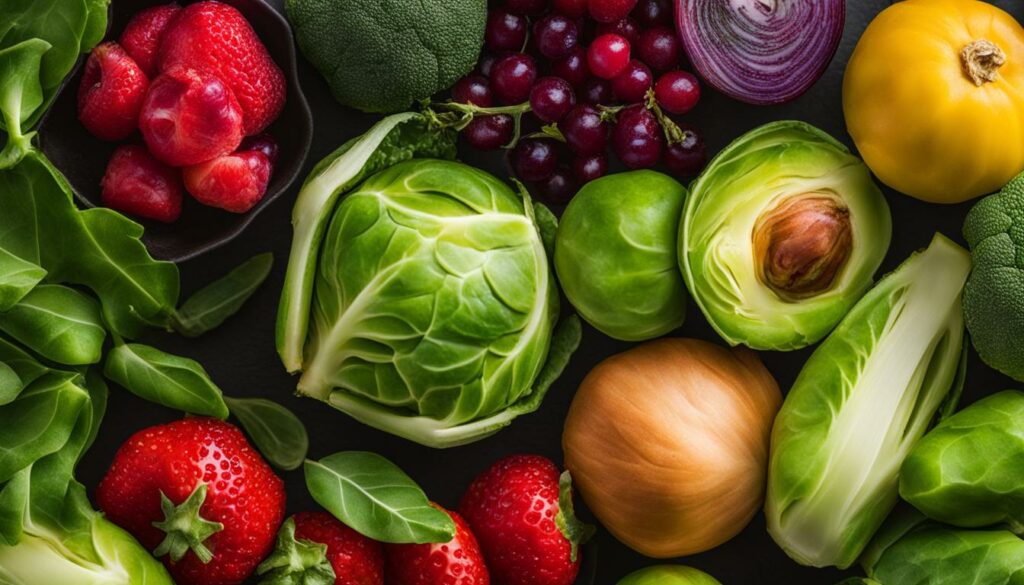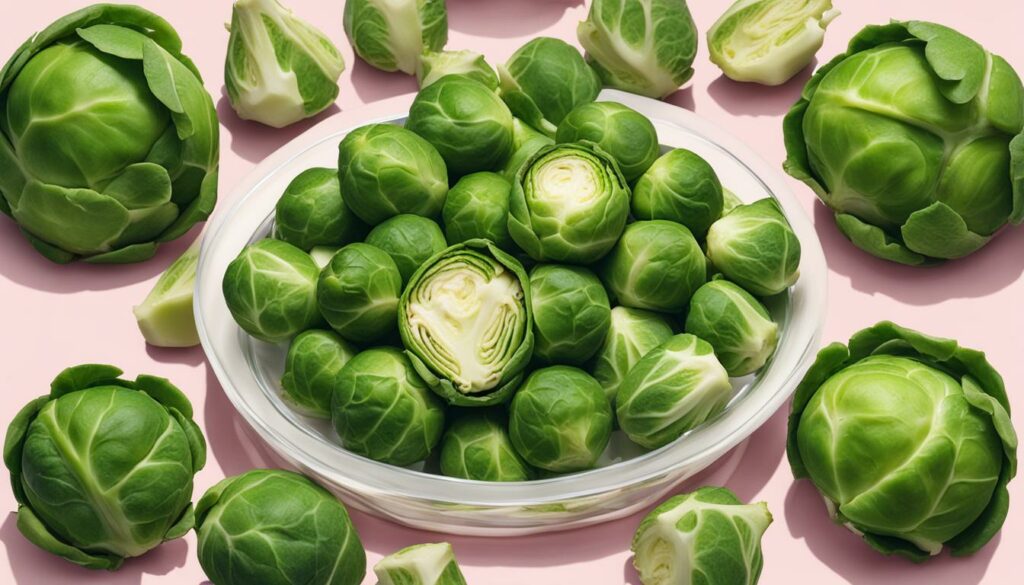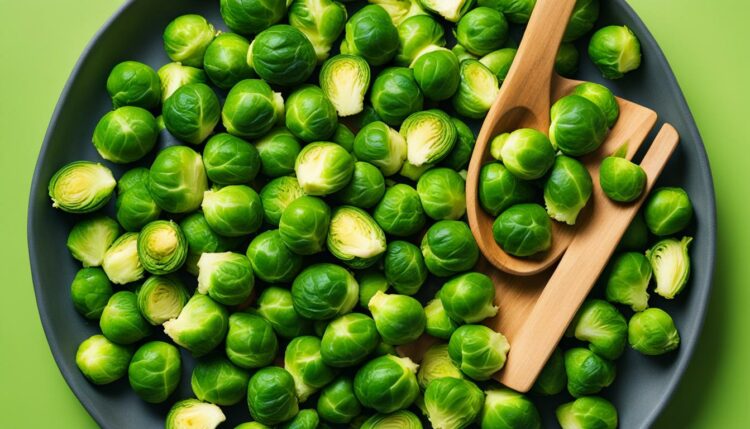Brussels sprouts are small, leafy green vegetables that belong to the cruciferous family. These mini cabbages may not be everyone’s favorite, but they pack a powerful nutritional punch.
Discover the numerous benefits of incorporating Brussels sprouts into your diet and how they can contribute to your overall health and well-being.
Key Takeaways:
- Brussels sprouts are low in calories but high in fiber, vitamins, and minerals.
- They are rich in nutrients like vitamin K and vitamin C, which are important for blood clotting, bone health, and immune function.
- Brussels sprouts are high in antioxidants, which help protect cells from damage.
- Their high fiber content supports digestive health and may reduce the risk of heart disease.
- Including Brussels sprouts in your diet can help decrease inflammation and improve blood sugar control.
Nutritional Benefits of Brussels Sprouts
Brussels sprouts are not only delicious, but they also offer a wide range of nutritional benefits that can support your overall health and well-being. Whether you’re aiming for weight loss, improved digestion, a healthy heart, or a strengthened immune system, incorporating Brussels sprouts into your diet can be a smart choice.
Here are some of the key ways that Brussels sprouts can benefit your body:
- Weight Loss: Brussels sprouts are low in calories and high in fiber, making them an excellent option for those looking to shed extra pounds. The fiber content in Brussels sprouts promotes feelings of fullness, helping to curb overeating and support weight loss goals.
- Digestion: The fiber in Brussels sprouts not only aids in weight loss but also supports healthy digestion. It acts as a natural cleanser for the digestive system, ensuring regular bowel movements and preventing constipation. Additionally, the fiber helps maintain stable blood sugar levels, promoting overall digestive health.
- Heart Health: Brussels sprouts contain high levels of antioxidants, such as vitamin C and vitamin K, which have been linked to heart health benefits. Antioxidants help reduce inflammation in the body and protect against oxidative stress, which can contribute to heart disease. Including Brussels sprouts in your diet may help support a healthy cardiovascular system.
- Immune System: The antioxidants found in Brussels sprouts also play a vital role in boosting the immune system. They help protect the body from harmful free radicals and strengthen the body’s natural defense mechanisms. A strong immune system is essential for fighting off infections and maintaining overall health.
With its impressive nutritional profile, Brussels sprouts offer a delicious and easy way to enhance your diet and reap numerous health benefits. Whether you enjoy them roasted, sautéed, or steamed, incorporating Brussels sprouts into your meals can be a simple yet effective step towards improving your overall well-being.
Health benefits of eating Brussels sprouts
Brussels sprouts offer a wide range of health benefits that can support your overall well-being. These nutrient-packed vegetables contain antioxidants that help protect against cell damage and promote healthy skin.
The high antioxidant content in Brussels sprouts can help improve the health and appearance of your skin. Antioxidants play a crucial role in neutralizing harmful free radicals, which can contribute to premature aging and skin damage.
Including Brussels sprouts in your diet can help maintain youthful-looking skin and a radiant complexion.
Additionally, Brussels sprouts contain carotenoids, which are beneficial for eye health. Carotenoids are plant pigments that act as antioxidants and help protect the cells in your eyes from oxidative stress.
Consuming Brussels sprouts regularly can contribute to maintaining good eye health and reducing the risk of eye diseases such as macular degeneration and cataracts.
Adding Brussels sprouts to your meals can provide these health benefits and support your skin and eye health.

Benefits of Brussels sprouts for skin:
- Rich in antioxidants that protect against cell damage
- Promote healthy and radiant skin
Benefits of Brussels sprouts for eye health:
- Contain carotenoids that support good eye health
- Help reduce the risk of eye diseases
Role of Brussels Sprouts in Reducing Inflammation
Brussels sprouts are not only delicious but also offer numerous health benefits, including their role in reducing inflammation. These tiny green gems are packed with anti-inflammatory properties, thanks to their high antioxidant content.
Inflammation is a natural response of the immune system to protect the body from injury and illness. However, when inflammation becomes chronic, it can contribute to various diseases and health conditions.
Consuming Brussels sprouts may help reduce inflammation in the body and promote a healthier inflammatory response.
Chronic inflammation has been linked to conditions such as heart disease, diabetes, cancer, and autoimmune disorders. The antioxidants found in Brussels sprouts help neutralize harmful free radicals, reducing oxidative stress and inflammation in the body.
By incorporating Brussels sprouts into your diet, you can support overall wellness and potentially lower the risk of chronic diseases.
One of the key anti-inflammatory compounds found in Brussels sprouts is sulforaphane. This powerful compound has been studied for its potential in reducing inflammation and inhibiting the activation of inflammatory pathways in the body.
Sulforaphane also supports the production of enzymes that provide protection against oxidative stress.
Regular consumption of Brussels sprouts can contribute to a balanced inflammatory response, promoting better health and well-being.
How Do Brussels Sprouts Reduce Inflammation?
The anti-inflammatory properties of Brussels sprouts can be attributed to their high levels of antioxidants, which help combat inflammation and oxidative stress. Additionally, Brussels sprouts contain beneficial compounds like glucosinolates, which are known for their potential anti-cancer and anti-inflammatory effects.
The table below highlights some of the key antioxidants and inflammatory compounds found in Brussels sprouts:
| Antioxidants | Inflammatory Compounds |
|---|---|
| Quercetin | Sulforaphane |
| Kaempferol | Indole-3-carbinol |
| Vitamin C | Isothiocyanates |
By consuming Brussels sprouts regularly, you can harness the benefits of these antioxidants and compounds to combat inflammation and promote better health.
Adding Brussels sprouts to your meals is an excellent way to reduce inflammation and support your overall well-being. Here are some simple and delicious ways to incorporate Brussels sprouts into your diet:
- Roast Brussels sprouts with olive oil, garlic, and lemon for a flavorful side dish.
- Sauté Brussels sprouts with onions and balsamic vinegar for a sweet and tangy twist.
- Add shredded Brussels sprouts to salads for a refreshing crunch.
- Toss Brussels sprouts with your favorite seasonings and roast them until crispy for a nutritious snack.
With their versatility and incredible health benefits, Brussels sprouts are an excellent addition to any meal. Start reaping the benefits of reduced inflammation by making Brussels sprouts a regular part of your diet.
Brussel Sprouts and Vitamin K
Brussel sprouts are not only delicious but also provide numerous health benefits. One of the key nutrients found in brussel sprouts is vitamin K, which plays a vital role in blood clotting and bone health.
Vitamin K is essential for proper bone growth and development. Adequate intake of vitamin K helps maintain strong and healthy bones, reducing the risk of conditions like osteoporosis.
If you are taking blood-thinning medication, it’s crucial to maintain a consistent intake of vitamin K. Balancing your vitamin K levels is essential to support healthy bone function while effectively managing your medication.
Incorporating brussel sprouts into your diet is a great way to boost your vitamin K intake and promote bone health.
| Bone Health Benefits of Brussel Sprouts |
|---|
| 1. Rich in vitamin K, which supports proper bone growth and development. |
| 2. Helps reduce the risk of osteoporosis and maintain strong bones. |
| 3. Provides a natural source of vitamin K for those taking blood-thinning medication. |

By including brussel sprouts in your meals, you can ensure optimal vitamin K levels and support your overall bone health.
How to incorporate Brussels sprouts into your diet
There are numerous delicious ways to enjoy Brussels sprouts and incorporate them into your daily meals. Whether you’re a fan of roasting, boiling, sautéing, or baking, this versatile vegetable can be prepared as a side dish or even take center stage as a main course. Let’s explore some creative and mouthwatering ways to cook Brussels sprouts:
1. Roasted Brussels Sprouts
The simple act of roasting Brussels sprouts in the oven can enhance their natural flavors and give them a crispy texture. To make roasted Brussels sprouts:
- Preheat your oven to 400°F (200°C).
- Trim the ends of the Brussels sprouts and halve them.
- In a bowl, toss the halved Brussels sprouts with olive oil, salt, and pepper.
- Spread them evenly on a baking sheet and roast for 20-25 minutes, or until they are golden and tender.
- Enjoy them as a delicious side dish or add them to a salad for extra crunch.
2. Brussels Sprouts Pasta
Adding Brussels sprouts to your pasta dishes can introduce a unique flavor and texture. Here’s how to make Brussels sprouts pasta:
- Cook your favorite pasta according to the package instructions.
- In a separate pan, sauté minced garlic and sliced Brussels sprouts in olive oil until they are tender.
- Toss the cooked pasta with the Brussels sprouts mixture.
- Add grated Parmesan cheese and salt to taste.
- Serve and enjoy a wholesome and satisfying meal.
3. Brussels Sprouts Stir-fry
A stir-fry is a quick and healthy way to prepare Brussels sprouts. Here’s a simple recipe for Brussels sprouts stir-fry:
- Heat some oil in a wok or large pan.
- Stir-fry thinly sliced Brussels sprouts with other vegetables like bell peppers, carrots, and mushrooms.
- Add soy sauce, oyster sauce, or your preferred stir-fry sauce for flavor.
- Cook until the vegetables are tender but still crisp.
- Serve with rice or noodles for a satisfying meal.
4. Brussels Sprouts Salad
Raw Brussels sprouts can be a great addition to your salads, offering a refreshing crunch. Here’s a simple Brussels sprouts salad recipe:
- Thinly slice the Brussels sprouts.
- In a bowl, combine the sliced Brussels sprouts with your favorite salad ingredients like cherry tomatoes, avocado, and feta cheese.
- Toss the salad with a zesty dressing, such as lemon vinaigrette or balsamic vinaigrette.
- Top with some toasted nuts or seeds for added texture.
- Enjoy a healthy and vibrant salad.
As you can see, there are countless ways to cook and enjoy Brussels sprouts. From roasted Brussels sprouts to pasta dishes, stir-fries, and salads, these nutritious vegetables can be a versatile and tasty addition to your diet. Get creative in the kitchen, try out different cooking methods and flavor combinations, and discover your favorite way to savor the goodness of Brussels sprouts.
Conclusion
Brussels sprouts, with their numerous health benefits, are a valuable addition to any diet. These vibrant green vegetables are packed with essential nutrients, antioxidants, and fiber, making them a nutritious choice for enhancing overall well-being.
Incorporating Brussels sprouts into your meals can provide various advantages. Their high fiber content supports healthy digestion and aids in weight loss efforts.
The abundance of antioxidants in Brussels sprouts contributes to heart health, bolsters the immune system, and promotes youthful skin. Moreover, their anti-inflammatory properties help in reducing inflammation and supporting a healthier inflammatory response in the body.
With the versatility of Brussels sprouts in cooking, there are numerous ways to enjoy them. Whether roasted, boiled, sautéed, or baked, these vegetables can be prepared as a delicious side dish or even the star of the main course.
Seasoning them with olive oil, salt, and pepper before roasting enhances their flavor, adding a delightful twist to your meal. You can also experiment by adding Brussels sprouts to your favorite pasta dishes, stir-fries, or frittatas, or even enjoy them raw in salads. The possibilities are endless!
By incorporating Brussels sprouts into your diet, you can reap the benefits it offers, such as weight management, improved digestion, a healthier heart, a strengthened immune system, clearer skin, and better inflammatory responses.
So, why not add this flavorful and nutrient-packed vegetable to your plate and take a step towards a healthier lifestyle?
FAQ
What are the benefits of eating brussel sprouts?
Brussels sprouts offer various health benefits. They are low in calories but high in fiber, vitamins, and minerals. They are rich in nutrients such as vitamin K and vitamin C, which are important for blood clotting, bone health, and immune function.
Brussels sprouts are also high in antioxidants, which help protect cells from damage. Their high fiber content supports digestive health and may reduce the risk of heart disease. Additionally, Brussels sprouts have been linked to decreased inflammation and improved blood sugar control.
They are an easy and versatile vegetable to incorporate into your diet.
What are the nutritional benefits of brussel sprouts?
Brussels sprouts are packed with essential nutrients. They are low in calories, making them a great option for weight loss. The fiber content in Brussels sprouts supports digestion and helps maintain healthy blood sugar levels.
The high levels of antioxidants in Brussels sprouts may contribute to heart health and boost the immune system. Incorporating Brussels sprouts into your diet can provide a range of nutritional benefits.
What are the health benefits of eating brussel sprouts?
Brussels sprouts offer various health benefits. Their antioxidant content helps protect against cell damage, promoting healthy skin. Brussels sprouts also contain carotenoids, which are beneficial for eye health. Including Brussels sprouts in your diet can support overall health and well-being.
What is the role of brussel sprouts in reducing inflammation?
Brussels sprouts have anti-inflammatory properties due to their high antioxidant content. Chronic inflammation is linked to various diseases, and consuming Brussels sprouts may help reduce inflammation in the body. Including Brussels sprouts in your diet can contribute to a healthier inflammatory response.
How do brussel sprouts contribute to bone health?
Brussels sprouts are a good source of vitamin K, which plays a vital role in blood clotting and bone health. Adequate vitamin K intake helps ensure proper bone growth and may help protect against conditions like osteoporosis.
It’s important to maintain a consistent vitamin K intake, especially if you are taking blood-thinning medication. Consuming Brussels sprouts can support optimal vitamin K levels and promote healthy bones.
How can I incorporate brussel sprouts into my diet?
There are many delicious ways to enjoy Brussels sprouts. They can be roasted, boiled, sautéed, or baked as a side dish or main course. Seasoning them with olive oil, salt, and pepper before roasting can enhance their flavor.
Brussels sprouts can also be added to pasta dishes, frittatas, stir-fries, or used as a topping for pizzas. They can even be enjoyed raw in salads. Experimenting with different cooking methods and flavors can help you find a preparation style that you enjoy.
What are the benefits of incorporating brussel sprouts into my diet?
Brussels sprouts offer a wide range of health benefits. They are rich in nutrients, antioxidants, and fiber, making them a valuable addition to any diet. Incorporating Brussels sprouts into your meals can support weight loss, digestion, heart health, immune function, and skin health.
They also have anti-inflammatory properties and are beneficial for eye health. With their versatility in cooking, there are numerous ways to enjoy Brussels sprouts. By including this nutritious vegetable in your diet, you can reap the benefits and enhance your overall well-being.




